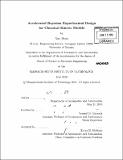| dc.contributor.advisor | Youssef M. Marzouk. | en_US |
| dc.contributor.author | Huan, Xun | en_US |
| dc.contributor.other | Massachusetts Institute of Technology. Dept. of Aeronautics and Astronautics. | en_US |
| dc.date.accessioned | 2010-10-29T18:10:01Z | |
| dc.date.available | 2010-10-29T18:10:01Z | |
| dc.date.copyright | 2010 | en_US |
| dc.date.issued | 2010 | en_US |
| dc.identifier.uri | http://hdl.handle.net/1721.1/59678 | |
| dc.description | Thesis (S.M.)--Massachusetts Institute of Technology, Dept. of Aeronautics and Astronautics, 2010. | en_US |
| dc.description | Cataloged from PDF version of thesis. | en_US |
| dc.description | Includes bibliographical references (p. 129-136). | en_US |
| dc.description.abstract | The optimal selection of experimental conditions is essential in maximizing the value of data for inference and prediction, particularly in situations where experiments are time-consuming and expensive to conduct. A general Bayesian framework for optimal experimental design with nonlinear simulation-based models is proposed. The formulation accounts for uncertainty in model parameters, observables, and experimental conditions. Straightforward Monte Carlo evaluation of the objective function - which reflects expected information gain (Kullback-Leibler divergence) from prior to posterior - is intractable when the likelihood is computationally intensive. Instead, polynomial chaos expansions are introduced to capture the dependence of observables on model parameters and on design conditions. Under suitable regularity conditions, these expansions converge exponentially fast. Since both the parameter space and the design space can be high-dimensional, dimension-adaptive sparse quadrature is used to construct the polynomial expansions. Stochastic optimization methods will be used in the future to maximize the expected utility. While this approach is broadly applicable, it is demonstrated on a chemical kinetic system with strong nonlinearities. In particular, the Arrhenius rate parameters in a combustion reaction mechanism are estimated from observations of autoignition. Results show multiple order-of-magnitude speedups in both experimental design and parameter inference. | en_US |
| dc.description.statementofresponsibility | by Xun Huan. | en_US |
| dc.format.extent | 136 p. | en_US |
| dc.language.iso | eng | en_US |
| dc.publisher | Massachusetts Institute of Technology | en_US |
| dc.rights | M.I.T. theses are protected by
copyright. They may be viewed from this source for any purpose, but
reproduction or distribution in any format is prohibited without written
permission. See provided URL for inquiries about permission. | en_US |
| dc.rights.uri | http://dspace.mit.edu/handle/1721.1/7582 | en_US |
| dc.subject | Aeronautics and Astronautics. | en_US |
| dc.title | Accelerated Bayesian experimental design for chemical kinetic models | en_US |
| dc.type | Thesis | en_US |
| dc.description.degree | S.M. | en_US |
| dc.contributor.department | Massachusetts Institute of Technology. Department of Aeronautics and Astronautics | |
| dc.identifier.oclc | 668222074 | en_US |
